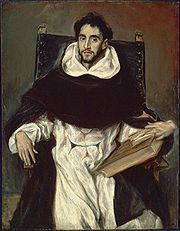
Hortensio Félix Paravicino
Encyclopedia

Spain
Spain , officially the Kingdom of Spain languages]] under the European Charter for Regional or Minority Languages. In each of these, Spain's official name is as follows:;;;;;;), is a country and member state of the European Union located in southwestern Europe on the Iberian Peninsula...
preacher
Preacher
Preacher is a term for someone who preaches sermons or gives homilies. A preacher is distinct from a theologian by focusing on the communication rather than the development of doctrine. Others see preaching and theology as being intertwined...
and poet from the noble house of Pallavicini
Pallavicini
The Pallavicini, Pallavicino, were an Italian noble family descended from Oberto I . The first Pallavicino fief was created by Oberto II, who received them it by Frederick Barbarossa in 1162...
.
He was born at Madrid
Madrid
Madrid is the capital and largest city of Spain. The population of the city is roughly 3.3 million and the entire population of the Madrid metropolitan area is calculated to be 6.271 million. It is the third largest city in the European Union, after London and Berlin, and its metropolitan...
and was educated at the Jesuit
Society of Jesus
The Society of Jesus is a Catholic male religious order that follows the teachings of the Catholic Church. The members are called Jesuits, and are also known colloquially as "God's Army" and as "The Company," these being references to founder Ignatius of Loyola's military background and a...
college in Ocafra, and on April 18, 1600 joined the Trinitarian Order
Trinitarian Order
The Order of the Holy Trinity is a Catholic religious order that was founded in the area of Cerfroid, some 80 km northeast of Paris, at the end of the twelfth century. The founder was St. John de Matha, whose feast day is celebrated on 17 December...
. A sermon pronounced before Philip III
Philip III of Spain
Philip III , also known as Philip the Pious, was the King of Spain and King of Portugal and the Algarves, where he ruled as Philip II , from 1598 until his death...
at Salamanca
Salamanca
Salamanca is a city in western Spain, in the community of Castile and León. Because it is known for its beautiful buildings and urban environment, the Old City was declared a UNESCO World Heritage Site in 1988. It is the most important university city in Spain and is known for its contributions to...
in 1605 brought Paravicino into notice; he rose to high posts in his order, was entrusted with important foreign missions, became royal preacher in 1616, and on the death of Philip III in 1621 delivered a famous funeral oration which was the subject of acute controversy.
His Oraciones evangélicas (1638-1641) show that he was not without a vein of genuine eloquence, but he often degenerates into vapid declamation, and indulges in far-fetched tropes and metaphor
Metaphor
A metaphor is a literary figure of speech that uses an image, story or tangible thing to represent a less tangible thing or some intangible quality or idea; e.g., "Her eyes were glistening jewels." Metaphor may also be used for any rhetorical figures of speech that achieve their effects via...
s. His Obras posthumas, divinas y humanas (1641) include his devout and secular poems, as well as a play entitled Gridonia; his verse, like his prose, exaggerates the characteristic defects of Gongorism, but was highly regarded in his lifetime. He was a great connoisseur of painting, but argued for the destruction of all paintings of nudes: "the finest paintings are the greatest threat: burn the best of them". However these views were too extreme for even 17th century Spain, where the King and leading courtiers kept galleries of such works in relatively private rooms, and his piece on the subject was not published in the pamphlet for which it was written.

